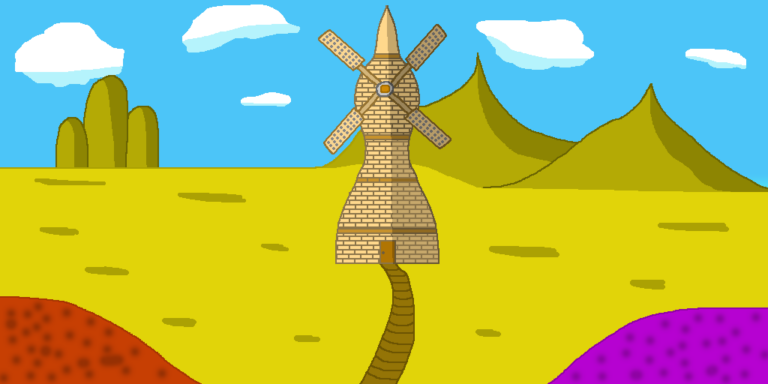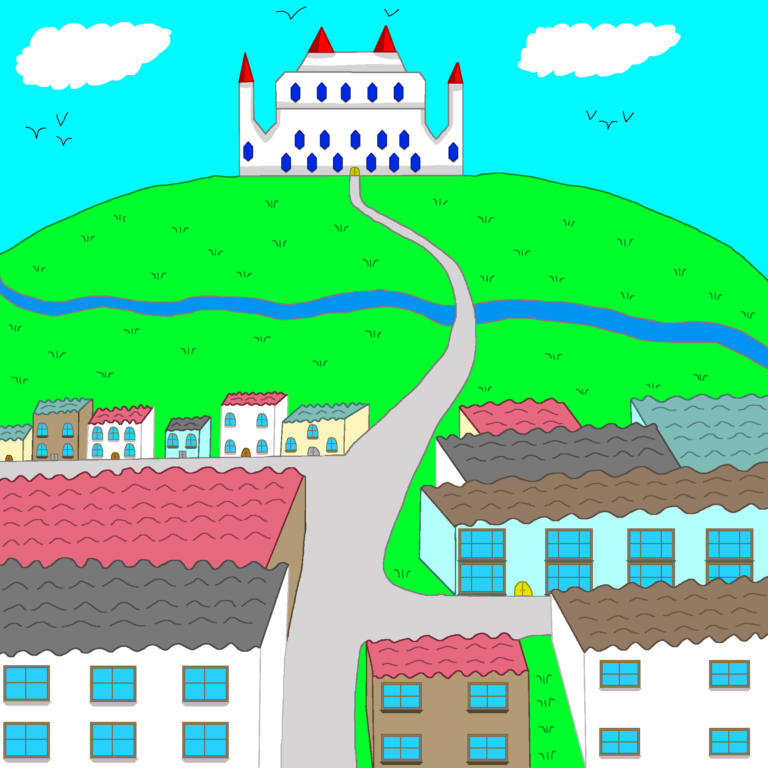Join US
Do you want to build the fantasy world you’ve always dreamed of?
Subscribe to receive notifications when a new post is out and for our monthly newsletter!
You can always unsubscribe anytime.


When people think of the countryside, one thing that’s likely to come to mind is the windmill. While this contraption sees its fair use in cities and towns, it truly shines in sparsely-populated areas since the power it generates from the wind is sufficient enough to give people an opportunity to do more using less power. In this article, we delve into the almighty fantasy windmill.
Many towns in fantasy feature a windmill or more, depending on its location as well as its terrain. Though many worlds have a medieval flair to it, it doesn’t lessen the effectiveness of the windmill. In fact, it enables people to do things that would have been previously difficult for them to do by themselves.
The fantasy windmill has many uses, both in rural and urban areas, though there may be some different uses depending on its location. For instance, one found in a city may provide the power for a business to make the products it sells whereas its countryside counterpart may be used to power the creation of grains that would later be delivered to the city.
While the majority of windmills may be found out in the country, you see some in towns and cities. However, that isn’t the only deciding factor. There are other considerations to account for when determining whether to place one or not. Some terrain are more beneficial for windmill use than others.
Like the sawmill, the fantasy windmill plays a significant role in the world. It is the first time people have learned how to harness the power of the wind, marking a key turning point in a burgeoning medieval society that will eventually industrialize at some point in the future. Nevertheless, the windmill is synonymous with medieval times due to it being one of the most used power sources, at least before the industrial revolution.
This is article number sixteen in the fantasy buildings series. If you like this article and would like to check out more, they’re conveniently located on our blog page!
There’s nothing like entering a town for the first time and seeing a great fantasy windmill that sits on the hill above the town and seeing it spinning. It serves as a physical representation of the indomitable human spirit determined to bend the awesome power of nature to its will. And it comes with many benefits that help everyone around it!
You can use a windmill in many different ways and in fantasy, there’s no shortage of creative ways you can go about it! For instance, in The Legend of Zelda: Ocarina of Time you muse use it to drain the well in Kakariko Village in order to gain access to the Bottom of the Well dungeon. In this circumstance, the windmill acts as a drainage agent to prevent the village from flooding in the event of the well overflowing.
While there are many fantastical uses, you can use the power of a fantasy windmill for more practical purposes. One such purpose would be to create grains that workers gathered from the crops out in the field. Using the wind lessens the time it takes for it to happen, thereby giving workers ample time to focus on other matters.

In cities, especially larger ones, you typically don’t see many windmills. However, you’re more likely to see some on the outskirts where there’s still plenty of room. Those are often used in various ways such as giving a bakery the power it needs to make its bread and pastries or acting as a ventilation agent for a forge so that the blacksmith can reach the heat needed to produce swords and other weaponry.
Though many fantasy worlds take place in medieval times, it doesn’t necessarily mean you have limited options as to how you’d use windmills. Rather, it gives you the opportunity to come up with ingenious ways to utilize them, showing your readers how they can do things they didn’t think were possible!
As a major power source in medieval-based worlds, the fantasy windmill can be found across a wide variety of locales. While you may come across them in cities and the countryside, when you’re creating an imaginary world, those two aren’t the only things to account for. The goal is to maximize their use and output, meaning there are things you need to account for in order to make it happen.
First and foremost is the terrain. The windmill is best suited for large expanses of flat or hilly areas. This makes it easy to build one and add more as needed. Mountainous areas are notoriously difficult to place one on since the world hasn’t advanced technologically to the point where it’s feasible to do so.
Secondly, it’s best to put a fantasy windmill in an area that sees many windy days. What’s the point of having a windmill in a place that isn’t windy? Having a consistent stream of wind ensures that the windmill is working and doesn’t have much downtime.

Thirdly, and tying into the second reason, the windmill works best in an area that is prone to stormy weather. Powerful gusts of wind usually accompany thunderstorms and these wind bursts can cause the windmill to spin faster than usual, generating more power. There is a caveat to this though, if it spins too fast, it might fall apart.
Some houses not too far from a wooded area have a windmill around them. Since they’re quite a distance away from the nearest town, those who live there prefer to do things by themselves without having other people help them. Having a windmill helps them get their chores done and lets them focus on more pressing matters.
The fifth and final place where you can come across a fantasy windmill is the farm. The windmill is practically synonymous with the farm and leans heavily into the idea of a countryside lifestyle. It just isn’t a farm if there isn’t a windmill somewhere around it.
With all of the advantages it offers, it comes as no surprise that the windmill plays a major role in regard to the world. Its core function is to use the power it generates from the wind to do things that would require the strength of several people to do, thereby saving time but it’s capable of much more than that.
This revolutionary contraption marks the first step in a world learning how to harness its natural environment and is considered a significant milestone towards the age of industrialization which is still a while off. Relying on the power of the windmill enables people to do things that previously were more difficult to do beforehand and use less power at the same time.
To the people living in the world, the fantasy windmill makes it easier to produce more goods in a shorter period of time. This has a wide-ranging effect on the medieval economy, from the textile industry being able to manufacture more clothes that shops can sell to its customers to bakeries creating more delicious yummy confections. Keep in mind that in the medieval age, it can only work if the windmill is right next to the building, not far away like in the real world.

Where the windmill truly shines is out in the countryside, in farms. It is a boon to the farmer who has a long and laborious day of turning their crops into sellable food. Using the power generated from the windmill helps create foods like grains by stripping out the undesired parts so that the farmer can maximize his profit which he can use to purchase more seeds for the next year.
But that isn’t its only use in the countryside; it can also pull out water from deep underground to provide it for the farmer, his family, and the animals living on the farm. In fact, this is its most common use since the river or stream might be a smidge too far from the house and no farmer will want to go there to fetch water everyday, especially in the dead of winter.
The fantasy windmill is a godsend to the medieval society. It lets people do laborious activities while using less power and takes up less time. Moreover, it is an iconic feature of the age, a sign that humans are beginning to learn how to harness the natural elements.
You can find a windmill in many places like cities and towns but one place you will definitely see one is way out in the country. This contraption is a gift to those who live out in the country as these people are self-reliant and having one in their backyard lets them deal with other, more important matters without having to rely on other people.
When envisioning where in the world to place a fantasy windmill, the first thing to do is to look at the terrain around it. Is it a favorable environment for wind development? Is it on nice flat ground or hilly terrain? In short, you want to put it in a location that makes sense, not in the middle of nowhere that gets little to no wind throughout the year.
Before the industrial revolution, the windmill was one of the top power sources people in medieval worlds relied on. They saw the enormous potential it offered and also saw how it gave them the chance to realize their dreams to do things they thought couldn’t be done. This would eventually change the economy forever as more people were able to sell more goods than ever before using less power.
Still contemplating whether to put one in your world? The fantasy windmill offers a rich number of benefits, many of which helps make the world you’re creating feel more vibrant and dynamic. Furthermore, it adds a realistic flavor to it which your readers will love.
There’s no better time to start bringing it into your world than today!
Let me know what you think in the comments below. (Note: this is an account-exclusive feature).
If you don’t have one, you can register here. It only takes a few moments of your time!
Liked this article and want to subscribe? All you have to do is fill out the form below and that’s it!
Thanks for reading this and until the next time,
Sunfire
Subscribing means you receive:
You can always unsubscribe anytime.
Do you want to build the fantasy world you’ve always dreamed of?
Subscribe to receive notifications when a new post is out and for our monthly newsletter!
You can always unsubscribe anytime.